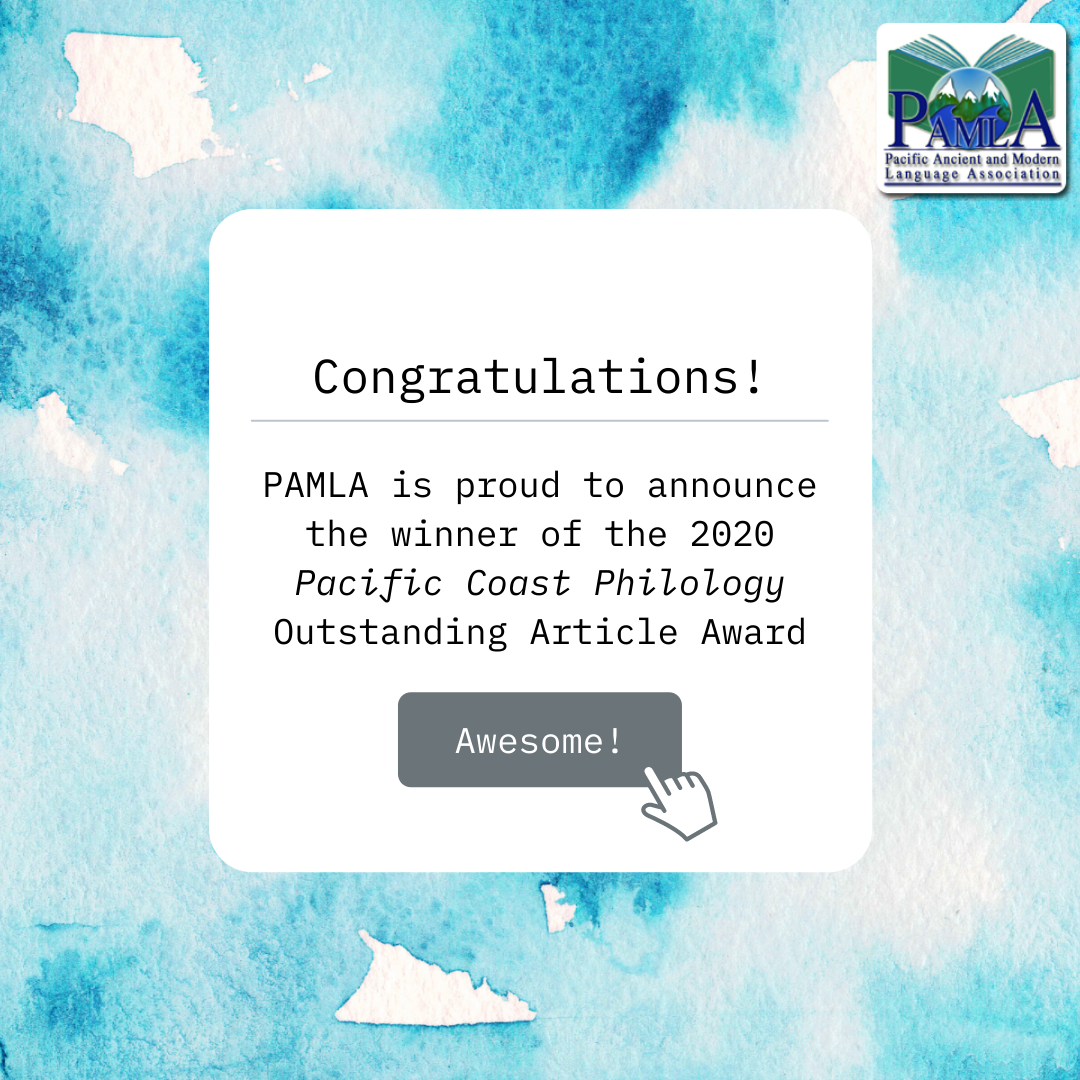
On behalf of PAMLA’s Pacific Coast Philology Award Committee, we are pleased to announce the winner of PAMLA’s Pacific Coast Philology Outstanding Article Award for 2020: Leila Silvana May’s “All the Reflected Light We Cannot See: (Ghastly) Mirror Imagery in Victorian Fiction” (Volume 54, Issue 2, 2019; in the “Ways of Seeing: Visuality, Visibility, and Vision”special issue guest edited by past PAMLA president Andrea Gogröf). In addition, the Committee wishes to recognize Chloe Allmand’s “‘Boy, Girl, You Are a Sword’: Male Viewer to Female Character Cross-Gender Identification in Game of Thrones” (Volume 54, Issue 2, 2019; also from the “Ways of Seeing: Visuality, Visibility, and Vision” special issue) with an Honorable Mention. Both essays are engaging, clear, and innovative articles that reflect the intellectual, academic writing we are proud to publish. The articles will be available to read open access for one year, thanks to our publisher, Penn State University Press.
Pacific Coast Philology (PCP), the journal of the Pacific Ancient and Modern Language Association, has been a leading literary and cultural studies journal, publishing peer-reviewed essays of interest to scholars in the classical and modern languages, literatures, and cultures for over fifty years. PCP publishes two annual issues on a wide array of timely, thought-provoking topics in the areas of culture, literature, aesthetics, ideology, film, and theory.
Leila May’s essay masterfully explores Victorian superstitions that “developed out of the curious nature of reflected images. Dangerous powers were sometimes attributed to mirrors, and these fears and suspicions were ‘mirrored’ in the fiction of the day. This article examines a number of scientific and phenomenological paradoxes of mirror images, such as the fact that these reflections are virtual images—their status in reality is only a visible one; they literally disappear when no eye or camera stares at them. When a person looks into a mirror they see a face that they will never see directly in all their life. As Richard Gregory says, we all have two faces, one that we only see indirectly, and the other is ‘an insubstantial ghost…. One’s own mirror reflection is un-dead.’ So, in fiction and in the real world, mirrors not only provoke narcissism, vanity, lust, and eventually disgust but also fear. No surprise that ghastly (equals ghostly) mirror images play significant roles in the fiction of the day. This article briefly discusses a number of Victorian novels and poems, and focuses primarily on Charlotte Brontë’s Jane Eyre and Villette, and on Lewis Carroll’s Through the Looking-Glass.”
Leila May is a professor in the Department of English at NC State University, where she has served as Director of the English Honors Program, and taught a wide range of courses on topics such as the Victorian Novel, the Female Gothic, Women and Madness, The Dickens Universe, Ghosts, Lunatics, and Lovers: The Brontë Sisters, Women in Literature: Alternative Narratives, and a University Honors seminar called Monstrosity, Madness, and Marginality. Her most recent book, Dialectics of Secrecy and Disclosure in Victorian Fiction, was published by Routledge in 2016.
Chloe Allmand’s essay offers a binary-breaking analysis of “cross-gender viewer identification” as a more recent phenomenon that “counters common understandings of the ‘male gaze’ as it relates to film. Specifically, with the rise of the girl hero and other non-sexualized heroines in film, male viewers can consciously imagine themselves as films’ heroines, not just as films’ heroes who possess the heroines, as Laura Mulvey argued in her essay ‘Visual Pleasure in Narrative Cinema.’ This article explores the possibilities for this type of identification through analysis of sisters Arya and Sansa Stark in the HBO series Game of Thrones, who represent two types of fantasy heroines: the warrior and the maiden. The article investigates the roles of stereotypical femininity and masculinity in constructing the ‘ideal’ fantasy heroine, and ultimately finds that fantasy heroines today are not admirable for their ‘masculine’ traits, but for their capabilities to operate outside of gender binaries.”
Chloe Allmand is a PhD student in rhetoric and composition and a graduate teaching assistant at Florida State University. She presented at the 2017 and 2018 PAMLA conferences, for what we hope to be the first of many times.
We greatly appreciate the academic dedication and intellectual rigor of Leila’s and Chloe’s articles, and encourage all of our members to read them, either online via JStor or Project Muse, hopefully via your library’s website, or in your print issue (if your library doesn’t receive Pacific Coast Philology please ask them to subscribe). Please do take time to read these two fascinating essays, and the many more in each issue of Pacific Coast Philology. We also encourage PAMLA members to submit essay proposals to Pacific Coast Philology. We will also be recognizing our award and honorable mention winners at this year’s PAMLA General Membership Meeting.
We hope that Leila and Chloe’s articles will be widely read across our great academic community, along with the many other fascinating, informative, scholarly essays published in Pacific Coast Philology, and that this award will encourage even more of our members—be they well-established, mid-career professors, lecturers, part-time faculty, independent scholars, or graduate students—to submit their scholarly articles to Pacific Coast Philology for consideration.
On behalf of PAMLA, we wish to thank this year’s Pacific Coast Philology Award Committee members, Professors Juan Delgado, Marta Albalá Pelegrín, and Yolanda Doub, and PAMLA Executive Director Craig Svonkin. PAMLA thanks the committee as well as our honorees for all of their work.
